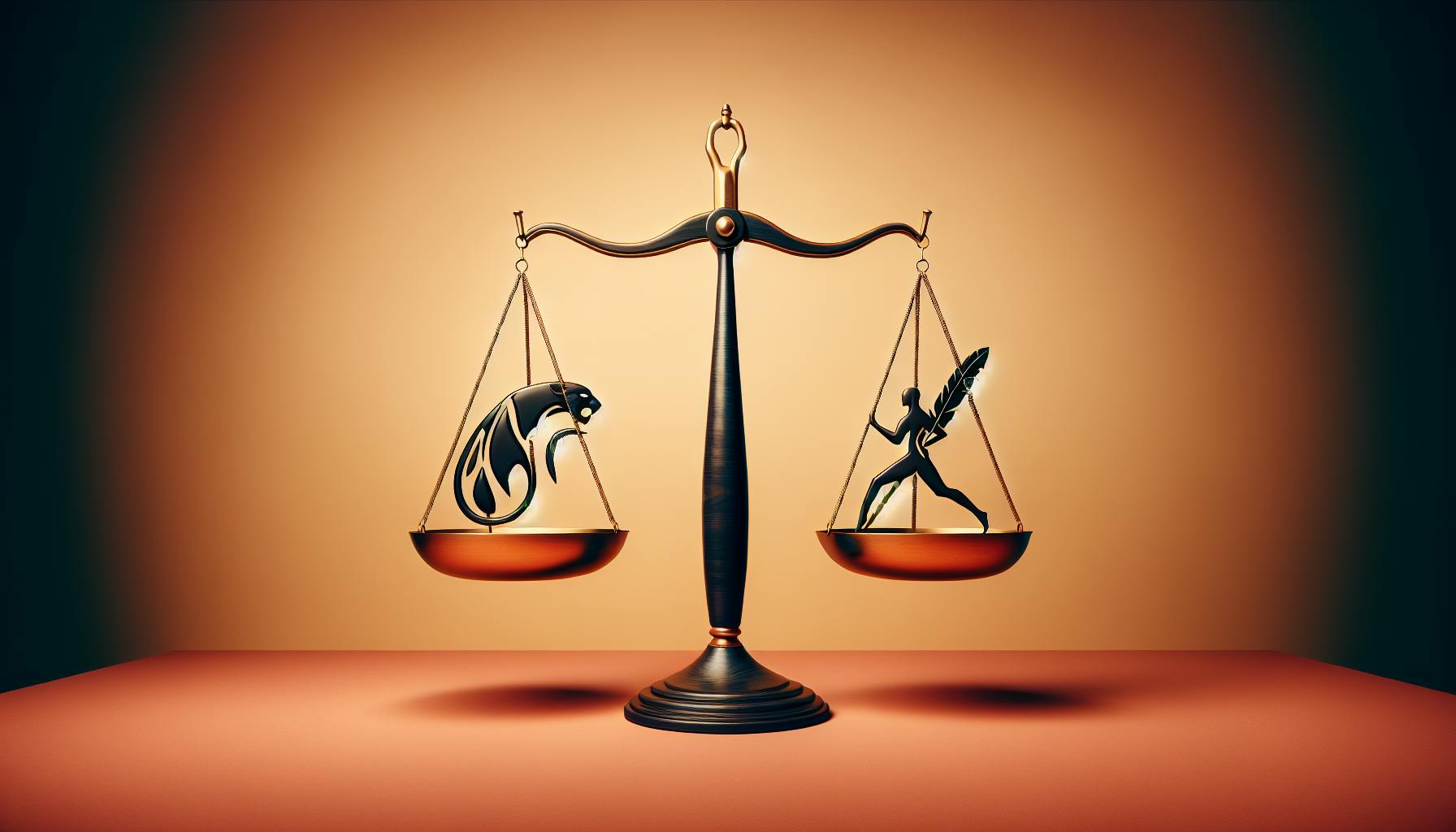Most can agree defamation cases are complex, balancing free speech, reputations, and the public interest.
This article will clarify two key privilege defenses - absolute and qualified - that can protect against defamation claims if certain conditions are met.
We'll define these defenses, explore examples of who may claim them, look at relevant case law, and summarize key takeaways for legal practitioners and those making public statements.
Introduction to Defenses in Defamation Cases
This section provides background on defenses to defamation, specifically focusing on absolute and qualified privilege. It defines key concepts and explains the strategic importance of these defenses in protecting individual rights and freedoms of speech.
Exploring the Landscape of Defamation Law
Defamation refers to a false statement that damages someone's reputation. The two main types are libel (written defamation) and slander (spoken defamation). For a plaintiff to successfully sue for defamation, they must prove that the defendant made a defamatory statement with the requisite guilty state of mind. Common defenses in defamation litigation include truth, consent, and privilege.
The Role of Defenses in Defamation Litigation
Absolute and qualified privilege offer complete defenses in defamation cases. They aim to balance reputational interests with First Amendment freedoms of speech. Privileges recognize that in certain contexts, open and free communication should be encouraged, even if defamatory statements are made.
Contrasting Absolute and Qualified Privilege
Absolute privilege provides complete immunity from liability, even for intentionally false and malicious statements. It applies narrowly to statements made during legislative, judicial, or other official proceedings. Qualified privilege offers limited protection if the statements were made without malice. It covers a broader range of contexts where the public interest is served by open communication.
What is the difference between the Defences of absolute privilege and qualified privilege?
Absolute privilege and qualified privilege are two legal defenses used in defamation cases.
The key differences between absolute privilege and qualified privilege are:
-
Absolute privilege provides complete immunity against defamation, regardless of malice or falsity. It applies to statements made in legislative, judicial, or other official proceedings.
-
Qualified privilege provides immunity only if the statements were made without malice and in certain situations serving public interest. The protection can be lost if plaintiff shows statements were made with negligence or recklessness.
For example, statements made by an attorney in a courtroom, or by a witness on the stand, have absolute privilege - they cannot be the basis for a defamation lawsuit even if false and malicious.
On the other hand, an employer providing a job reference has qualified privilege. The employer can be sued for defamation if the reference was false and provided with negligence or malice.
In summary, absolute privilege grants full immunity for defamatory statements made in official proceedings, while qualified privilege offers limited protection depending on context and requires an absence of malice or negligence.
What is the defense to defamation absolute privilege?
Absolute privilege provides complete protection against defamation lawsuits for statements made by certain individuals in certain contexts. This privilege applies to statements made by public officials, judicial officers, attorneys, jurors, witnesses, and others involved in legal proceedings.
Some key things to know about absolute privilege as a defense against defamation:
-
It provides full immunity against defamation claims, even if the statements are false or malicious. Plaintiffs generally cannot prevail in a defamation suit against someone with absolute privilege.
-
The policy rationale is to encourage open and candid participation in legal proceedings and the functions of government. People need to be able to speak freely without fear of liability.
-
Absolute privilege attaches to statements made in legislative, judicial, and other official proceedings. This includes statements made in pleadings filed with the court, statements made during trial, etc.
-
The privilege only applies to statements relevant to the proceeding at issue. It does not apply to statements made outside of the proceeding.
So in summary, absolute privilege gives complete protection to certain persons to make statements connected to their official roles without risk of defamation liability, in order to facilitate the integrity of legal and governmental processes. It is an absolute bar to lawsuits for defamatory statements made in the proper context.
What is the absolute defense to defamation?
Truth is the absolute or complete defense to a defamation claim. If the statements made by the defendant are substantially true, they cannot be considered defamatory, regardless of any harm caused.
To establish a truth defense, the defendant needs to show that the "gist" or "sting" of the statements is true. Minor inaccuracies that do not alter the substance of the statements will not defeat the truth defense. As long as the main point being conveyed is factually correct, the statements are protected.
For example, if a newspaper article stated that a businessman had been convicted of fraud, when in fact he had only been charged but not yet convicted, this would likely still be covered by the truth defense. The core factual statement - that the businessman was accused of fraud - would be true. Small details like a conviction vs charges would not change the essential accuracy.
The policy behind the truth defense is to encourage truthful statements in the public discourse, even if embarrassing or harmful to someone's reputation. As long as the statements are rooted in facts rather than falsehoods, they are deemed privileged under defamation law. Truth trumps reputation in the eyes of the law.
In sum, establishing substantial truth is an absolute defense against defamation liability. Minor inaccuracies in details do not defeat this defense, as long as the "sting" of the statements is still factually correct. This gives speakers some leeway to get small facts wrong, as long as their core message is truthful.
sbb-itb-585a0bc
What is the qualified privilege defense?
The qualified privilege defense protects statements made without actual malice in certain situations where there is a public or private interest. Unlike absolute privilege, qualified privilege may be lost if it is abused.
Some examples of where qualified privilege applies:
-
Employment references - An employer providing a reference for a current or former employee is generally protected by qualified privilege. The employer must act without malice and in the interest of giving an honest assessment.
-
Statements to authorities - Statements made to law enforcement, regulatory agencies, or other authorities may be subject to a qualified privilege defense. The statements must be made without malice and in the interest of public safety or compliance.
-
Public interest reporting - News reports on matters of public concern may be protected by qualified privilege if reported fairly and accurately. However, maliciously false statements or misrepresenting the facts could defeat the privilege.
To overcome a qualified privilege defense, the plaintiff generally must show the defendant acted with malice or otherwise abused the privilege. Examples of abuse could include making statements to those without a legitimate interest, making statements outside the scope of privilege, or making knowingly false statements. The plaintiff bears the burden of proving abuse by clear and convincing evidence.
So in summary, qualified privilege protects good faith statements made without malice in limited situations serving a public or private interest. It is not an absolute defense but may fail if abused. Plaintiffs can defeat the defense by showing malice or other abuse of the privilege.
Absolute Privilege as a Complete Defense
This section delves into the concept of absolute privilege as a defense in defamation cases, its scope, and implications for public officials and legal participants.
Defining Absolute Privilege and Its Implications
Absolute privilege refers to complete immunity from liability for defamation. It protects statements made in legislative, judicial, or other official proceedings, even if those statements are false or malicious.
Absolute privilege provides an absolute defense against defamation claims as it allows public officials and participants in legal proceedings to speak freely without fear of civil liability. This furthers the public interest by encouraging the free flow of information in governmental and legal settings.
However, absolute privilege also means that defamed parties have no legal recourse even if false and damaging statements are made about them during proceedings. The rationale is that the public good outweighs individual harm.
Who Has Absolute Privilege: Public Officials and Legal Participants
Absolute privilege applies to statements made by:
- Public officials carrying out official duties, like legislators speaking during legislative sessions
- Witnesses testifying in judicial or quasi-judicial proceedings
- Attorneys or parties making statements related to a case, like in pleadings, affidavits, or open court
- Judges, magistrates, and quasi-judicial officers in judicial proceedings
So statements made by those playing an integral role in governmental or legal proceedings are protected by absolute privilege.
The Irrelevance of Falsity Under Absolute Privilege
Truth is an absolute defense against defamation under qualified privilege. However, under absolute privilege, even demonstrably false and malicious statements enjoy absolute immunity.
Absolute privilege is intended to promote free speech on important public matters. So the truth or falsity of statements made by public officials or trial participants is considered irrelevant.
Challenges in Overcoming an Absolute Privilege Defense
It is extremely difficult for plaintiffs to overcome an absolute privilege defense due to its expansive nature. Plaintiffs essentially have no legal standing regardless of the falsity or maliciousness since open debate is prioritized over individual reputation.
Overcoming absolute privilege requires proving the statements were made outside one's official capacity or that the proceeding itself was a sham. But there are significant barriers to meeting either condition.
So absolute privilege gives public servants and trial participants extensive protections, while defamed parties have limited recourse, furthering governmental and legal interests over individual rights.
Navigating the Nuances of Qualified Privilege
This section examines the intricacies of qualified privilege as a defense to defamation, including its application in both public and private spheres.
Understanding the Boundaries of Qualified Privilege
Qualified privilege provides a defense in defamation cases where there is a privileged occasion for making a defamatory statement. Unlike absolute privilege which provides complete immunity, qualified privilege can be lost if it is abused. There is a balance between protecting individual rights and allowing recovery for tort damages.
Qualified privilege applies when the statement is made to serve public or private interests. The defendant must show the statement was made on a privileged occasion, in good faith, and limited to serve those interests. Privileged occasions include statements made to public officials, media publications on public concerns, employment references, and credit reports.
The boundaries of qualified privilege are exceeded if the plaintiff shows the defendant acted with malice or negligence. This requires proving the defendant knew the statement was false or acted in reckless disregard of the truth with clear and convincing evidence.
Qualified Privilege in Various Contexts
In addition to public official duties, qualified privilege can apply to statements made in judicial, legislative, or administrative proceedings. It also covers private business dealings, employment matters, school disciplinary issues, and public safety concerns.
For example, a negative employment review given to a prospective employer may be protected, provided it was made in good faith without malice. Another common example is consumer credit reporting. Credit agencies have qualified privilege when reporting financial data to creditors, provided the reports are accurate and appropriate.
The Burden of Proof in Overcoming Qualified Privilege
The plaintiff carries the burden of proving the qualified privilege was abused. This requires showing the defendant acted negligently with a reckless disregard of the statement's truth or falsity. Alternatively, proving actual malice - knowledge of falsity or reckless disregard for the truth - can defeat the privilege.
The standard of proof is clear and convincing evidence rather than a mere preponderance. Showing the statement was false is insufficient alone to overcome qualified privilege without meeting the higher burden to prove abuse. Failing to investigate the truth of a statement is generally insufficient to constitute negligence or defeat the privilege.
Qualified Privilege Case Law: Illustrative Examples
In Krauss v. Globe International, Inc. (1993), a reporter relied on a source alleging Elizabeth Taylor used unprescribed drugs. The court ruled the story covered a matter of public concern and the reporter acted reasonably in relying on the source. This met the standard for qualified privilege absent proof of malice.
In contrast, in Stuempges v. Parke, Davis & Co. (1983), the court overcame a qualified privilege defense for a defamatory employment review. It found reckless disregard in failing to investigate documented contradictions of the negative evaluation. This met the standard to show abuse of the qualified privilege and supported liability.
Real-World Applications of Absolute and Qualified Privilege
This section provides concrete examples of situations in which absolute and qualified privilege defenses are invoked, illustrating their application in actual defamation cases.
Statements by Government Officials: An Absolute Privilege Example
Absolute privilege applies to statements made by government officials in the course of their official duties. For example, a state legislator cannot be sued for defamation for statements made during legislative proceedings, even if the statements are false and damaging. This allows government officials to speak freely on matters of public concern without fear of liability.
Communications in a Private Business Meeting: A Qualified Privilege Example
Qualified privilege may apply to statements made during private business meetings. For example, an employer's statements about an employee during a private meeting with other company executives would likely be protected by qualified privilege. However, the statements must be made without malice and for a reasonable purpose related to the executives' shared business interests.
Consumer Reviews and Qualified Privilege: Balancing Rights and Responsibilities
Consumer reviews posted online generally have qualified privilege protections, allowing individuals to share their honest opinions and experiences. However, reviewers still have a duty to avoid false statements or posting reviews solely out of spite or ill-will. If reviews are excessively negative despite no real basis for the claims, the protections of qualified privilege could be lost in a defamation lawsuit. There is always a balance between protecting free speech and accountability for false, damaging speech.
Conclusion: Essential Points on Privilege Defenses in Defamation
Recapitulating the Core Concepts of Privilege Defenses
Absolute and qualified privileges play an important role as affirmative defenses in defamation cases. Absolute privilege provides complete protection against liability for defamation, regardless of falsity or negligence. It applies to statements made by public officials, judicial officers, attorneys, jurors, witnesses and more in judicial, legislative or other official proceedings. Qualified privilege applies when there is no evidence of actual malice, providing limited protection. Both are aimed at balancing individual rights, public discourse and the broader societal good.
As we have seen, privileges uphold freedoms of speech while providing recourse for unjustified attacks on reputation. Key takeaways include:
- Absolute privilege grants immunity for statements made in official contexts, even if false or negligent. This supports open discourse.
- Qualified privilege requires a reasonable belief in a statement's truthfulness and public interest purpose. This balances rights.
- Plaintiffs must prove actual malice to overcome qualified privilege defenses.
- Both privileges limit damages for defamation under certain conditions.
In summary, privilege defenses recognize speech protections alongside individual rights, calibrating liability.
Implications for Legal Practitioners and Public Discourse
For attorneys and officials, absolute privilege grants latitude to zealously represent and fulfill duties without constant threat of liability. This facilitates the adversarial system and legislative oversight. However, ethical obligations remain - privilege should not protect outright lies or abuse.
Broader societal impacts also follow. By protecting good faith communications in the public interest, qualified privilege fosters transparency and discourse. However, it still allows recourse for malicious falsehoods. This careful balance continuously evolves with case law.
As qualified privilege considers evolving context, practitioners must stay updated on standards of care and reasonableness in their jurisdiction. Acting as informed officers of the court remains key.
Future Considerations in Defamation and Privilege
In future defamation cases, privileges will likely continue upholding free expression within careful bounds - limiting damages absent actual malice while allowing good faith discourse. However, statutes and standards of care may shift with technology, politics and society. Practitioners should track case law in their jurisdiction as qualified privilege evolves.
Open questions remain around applying qualified privilege to evolving digital media. As communication channels proliferate, what constitutes reasonableness and public interest may change. Absolute privileges may also face re-examination given potential for abuse. Defenses must keep pace with emerging societal priorities.
In conclusion, privileges play an essential role in balancing rights, duties and liabilities in defamation law. Their careful application will continue shaping public discourse.


